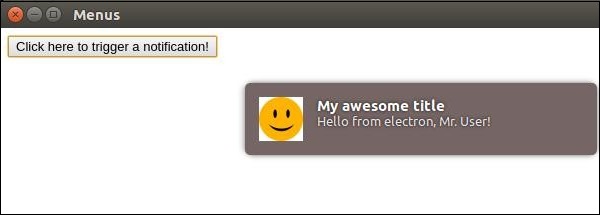
- Electron - Home
- Electron - Overview
- Electron - Installation
- How Electron Works?
- Electron - Hello World
- Electron - Building UIs
- Electron - File Handling
- Electron - Native Node Libraries
- Inter Process Communication(IPC)
- Electron - System Dialogs
- Electron - Menus
- Electron - System Tray
- Electron - Notifications
- Electron - Webview
- Electron - Audio & Video Capturing
- Electron - Defining Shortcuts
- Electron - Environment Variables
- Electron - Debugging
- Electron - Packaging Apps
- Electron - Resources
Electron - Notifications
Electron provides native notifications API only for MacOS. So we are not going to use that, instead we'll be using a npm module called node-notifier. It allows us to notify users on Windows, MacOS and Linux.
Install the node-notifier module in your app folder using the following command in that folder −
$ npm install --save node-notifier
Let us now create an app that has a button which will generate a notification every time we click on this button.
Create a new main.js file and enter the following code in it −
const {app, BrowserWindow} = require('electron')
const url = require('url')
const path = require('path')
let win
function createWindow() {
win = new BrowserWindow({width: 800, height: 600})
win.loadURL(url.format ({
pathname: path.join(__dirname, 'index.html'),
protocol: 'file:',
slashes: true
}))
}
app.on('ready', createWindow)
Let us now create our webpage and script that will trigger the notification. Create a new index.html file with the following code −
<!DOCTYPE html>
<html>
<head>
<meta charset = "UTF-8">
<title>Menus</title>
</head>
<body>
<button type = "button" id = "notify" name = "button">
Click here to trigger a notification!</button>
<script type = "text/javascript">
const notifier = require('node-notifier')
const path = require('path');
document.getElementById('notify').onclick = (event) => {
notifier.notify ({
title: 'My awesome title',
message: 'Hello from electron, Mr. User!',
icon: path.join('','/home/ayushgp/Desktop/images.png'), // Absolute path
(doesn't work on balloons)
sound: true, // Only Notification Center or Windows Toasters
wait: true // Wait with callback, until user action is taken
against notification
}, function (err, response) {
// Response is response from notification
});
notifier.on('click', function (notifierObject, options) {
console.log("You clicked on the notification")
});
notifier.on('timeout', function (notifierObject, options) {
console.log("Notification timed out!")
});
}
</script>
</body>
</html>
The notify method allows us to pass it an objectwith information like the title, message, thumbnail, etc. which help us customize the notification. We can also set some event listeners on the notification.
Now, run the app using the following command −
$ electron ./main.js
When you click on the button that we created, you will see a native notification from your operating system as shown in the following screenshot −

We have also handled the events wherein, the user clicks the notification or the notification times out. These methods help us make the app more interactive if its running in the background.